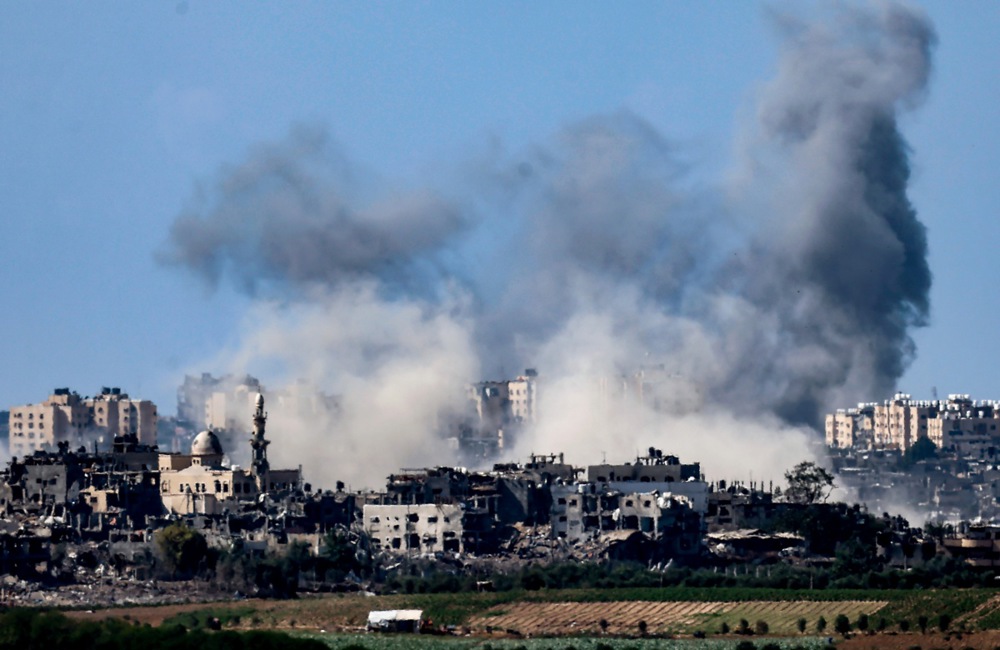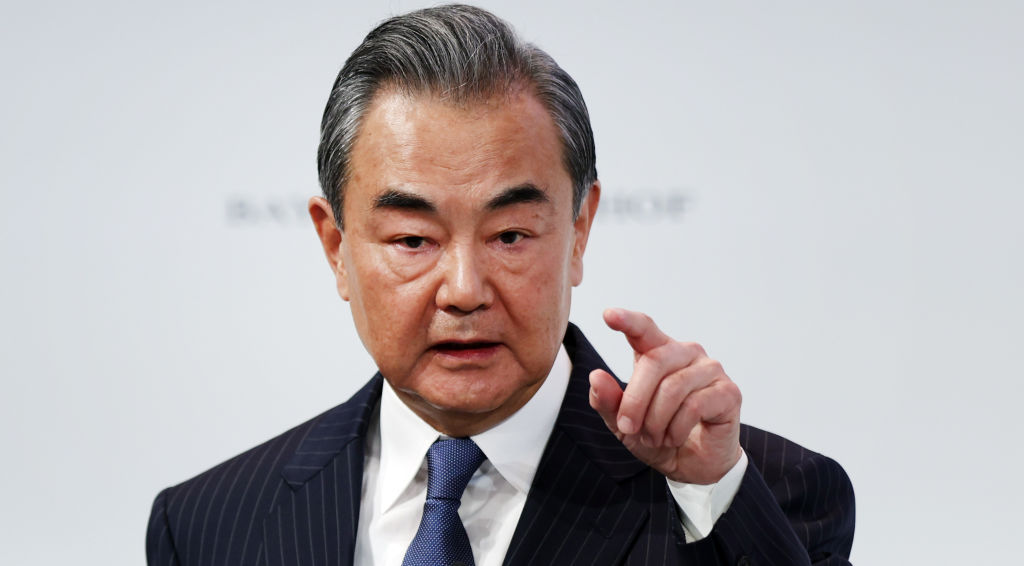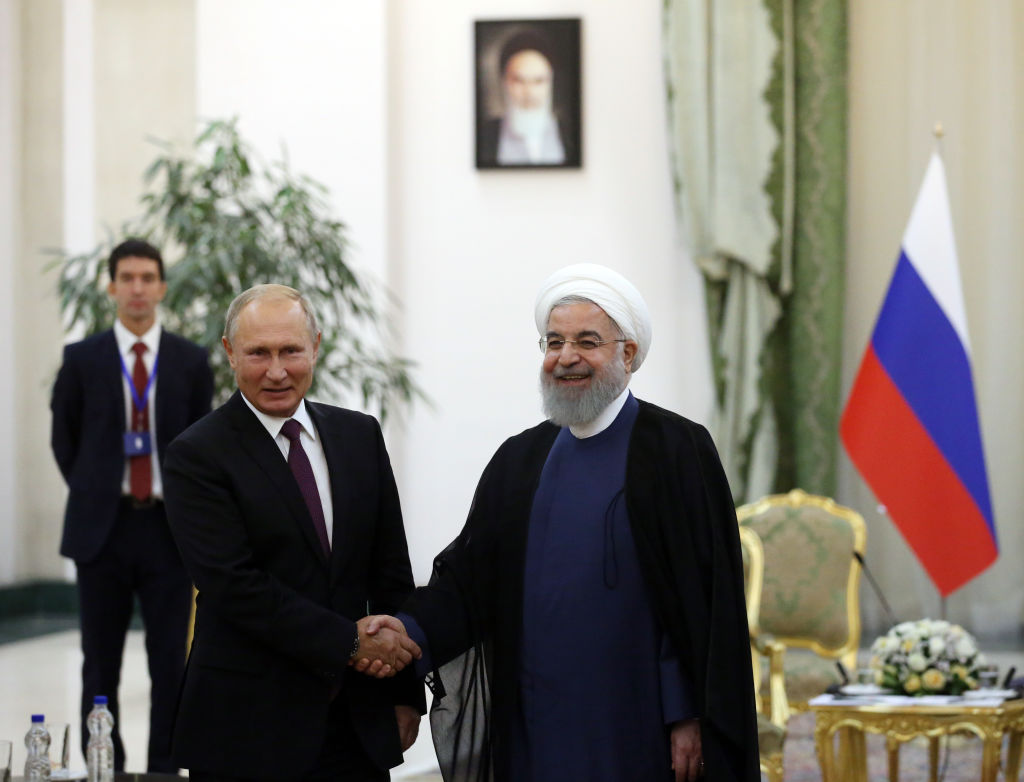As the USS Dwight D Eisenhower Carrier Strike Group steams at full speed across the Atlantic towards the Middle East, the hope must be that the United States, alongside Israel, is truly preparing a decisive blow against Iranian proxies – and against Iran itself if necessary. Nothing less than an attitude of unquestionable resolve and complete intransigence in the face of evil will do, in these circumstances. There is no room for bluffing anymore.
The time for talks, “ceasefires” and “de-escalation” via diplomacy, is long gone. The West – particularly the Obama administration but, let’s not forget, with the full support of the EU, Germany, France and the UK – not only failed to contain Iran and stabilise the region over the past decade, but actively invited the current chaos through a policy of weakness. Such an approach never works against an implacable, revolutionary and psychopathic enemy; it failed with Hitler’s Nazi Germany in the 1930s and it has now failed with the Ayatollahs’ Iran, not to mention the jihadi Palestinians of ISIS-Hamas.
Like the Russians, these bloodthirsty medieval fanatics – whether they wear suits working in government offices in Tehran or lounging in villas in Qatar, or whether they’re lurking in combat fatigues in underground holes under Gaza – only understand one language: force and violence. They only respect and fear strength.
This is why it is crucially important that America genuinely switches quickly to a highly aggressive posture backed by overwhelming power. But this requires strong political leadership.
Such a change will shock delicate peacenik sensibilities among the emotionally-fragile Western publics, and it will not look very nice when the full military might of the US is unleashed, but there is no other way to restore deterrence and the credibility of American power on which our entire post-WW2 way of life ultimately depends.
One doesn’t need to look further than Ukraine to see what happens when deterrence fails and the destruction begins. A second failure in the Middle East would convince the neo-Axis powers, from Moscow to Tehran, Beijing and Pyongyang that the West and its allies and interests are fair game; there is no coming back from that kind of situation.
The imperative in the Middle East from a strategic Western perspective, therefore, is escalation, not some diplomatic “solution”. The danger now is in using too little force, not too much.
This is why the calls for ceasefires or so-called “humanitarian pauses” are so pernicious: they only play into the enemy’s hands by arresting our momentum in the wake of October 7 and weakening our resolve.
What we now see playing out in the political arena is the same dynamic that led to the disastrous 2013 Syria episode, when Obama backed down from his own “red line” on the use of chemical weapons in that country’s civil war.
After Bashar al-Assad’s forces unleashed nerve gas on Ghouta near Damascus, what followed was not the expected prompt US strike – that could’ve ended the entire conflict – but days of prevarication and intra-West political mayhem fuelled by Russian disinformation and the usual “humanitarian” handwringing from the likes of the BBC. Assad crossed Obama’s red line. To the applause of the “prudent” non-interventionists and the anti-war brigade of the West no decisive action was taken. The Syrian dictator went on to butcher his people and others for ten more years.
Iran and its partners in terror, from the Palestinians to Hezbollah, the Houthis and beyond, think they have our measure: that they can commit the most heinous, inhuman atrocities against citizens of a Western democratic ally, in the Holy Land, and that we are too weak-willed, morally-corrupted, “human rights”-blinded, and strategically-confused to “get involved”.
Iranian proxies have even been openly attacking US bases across the region over the past week, mostly with impunity. Ultimately this will likely be proven to have been a fatal miscalculation on their part, of the kind made by Imperial Japan in 1941 or the North Koreans ten years later.
What happens over the next week or so will determine the fate of the Middle East and, by extension, that of Europe and of US power.
Israel has effectively stayed its hand in Gaza, so far, ostensibly in order to give time to the US military to redeploy extra forces to the region; for example, the Eisenhower CSG will arrive on station in about 7-8 days.
The IDF is also using this interval to finesse its plans and try to degrade the ISIS-Hamas forces in Gaza through airstrikes. Israeli casualties during the ground offensive could be as high as 5,000, so anything that can be done ahead of time – any extra missile or bomb dropped on terrorists in the Strip – to give those brave IDF men and women a better chance against the Hamas beasts, will be welcome, militarily.
But a week is a long time in geopolitics, and it is hard to trust that president Biden’s administration – staffed with Obama’s old team, including Antony Blinken himself – will hold firm. For example, in purely military terms the essential first strategic move for the US and Israel is to wipe out Iran’s key assets – especially air defence, but other formations too – in Syria. It may also be necessary to support Israel in a pre-emptive strike on Hezbollah in Lebanon.
This is the kind of action that is required now: offensive, overwhelming, bold. Anything less raises the spectre of betrayal towards Tel Aviv. Are the American military redeployments to the Middle East a preparation for direct intervention alongside Israel against Iranian proxies, or are they a way for the White House to “buy time”, let the pressure build on Israel, and ultimately force it into some compromise?
Already there are worrying signs. The eagerness with which US allies like the UK and Canada joined the “humanitarian pause” change of tempo suggested by Blinken is telling. Even more significant was Barack Obama’s own intervention on Tuesday when he publicly criticised Israel’s siege tactics in Gaza.
Another concerning indication was president Erdogan’s outrageous – even by his standards – statement on Wednesday that Hamas is not a terrorist organisation but a liberation group.
Given that the prerequisite for any decisive US military intervention in Israel’s support is deterring Turkey or buying it off in some other way, this positioning by the Turkish leader suggests that the Americans are either failing or not even trying very hard to placate him. These are just some of the considerations at play.
At this moment of moral, political and strategic tension, when the stakes are so high, the public debate cannot be allowed to be dominated by precisely the weak liberal and naïve self-flagellating attitudes and mindsets that brought us to this pass. The case must be made across Western nations, with renewed vigour, for the virtue of using force in support of vital national and allied interests first and foremost. But “Give war a chance” – the title of a seminal 1999 essay by Edward Luttwak – is also a humanitarian proposition insofar as it makes the arrival of enduring peace more likely.
There are times when wisdom in foreign affairs calls for a prudent course and crafty strategies; other times, cleverness, nimbleness and even a measure of risk-taking are better suited, and are the wiser option in the circumstances.
But every so often a sudden crisis occurs, of a magnitude and stakes that outstrip any experience in a generation, when the danger has to be put down swiftly and definitively with maximum force – precisely to limit the damage and loss of life down the road. After all, “The general who does not look impassively at a battlefield”, Napoleon once said, “causes a great number of people to be killed unnecessarily”.
Gabriel Elefteriu is deputy director at the Council on Geostrategy in London and a fellow at the Yorktown Institute in Washington, D.C.






The West can’t allow itself to seem weak: Biden and Blinken’s humiliation in the Middle East must be answered in kind